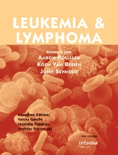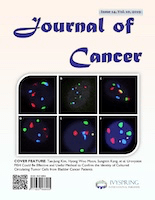
Clinical Medicine Insights-Oncology
Scope & Guideline
Transforming cancer care with high-quality research.
Introduction
Aims and Scopes
- Cancer Biomarkers and Prognosis:
The journal extensively explores the identification and validation of biomarkers that can predict cancer progression, treatment response, and patient prognosis across various cancer types. - Innovative Therapeutic Strategies:
There is a strong emphasis on novel therapeutic approaches, including immunotherapy, targeted therapies, and combination treatments that aim to improve survival rates and quality of life for cancer patients. - Clinical Trials and Observational Studies:
The journal includes findings from both clinical trials and observational studies, highlighting real-world evidence that can inform treatment protocols and clinical guidelines. - Molecular and Genetic Insights:
Research on the molecular and genetic underpinnings of cancer, including the role of specific genes and mutations in tumor behavior, is a core focus area. - Patient-Centered Research:
The journal emphasizes studies that incorporate patient perspectives and quality of life assessments, aiming to align treatment strategies with patient needs and preferences.
Trending and Emerging
- Immunotherapy and Checkpoint Inhibitors:
There is a marked increase in research focused on immunotherapy, particularly checkpoint inhibitors, as they represent a significant advancement in cancer treatment, showing promise in multiple malignancies. - Liquid Biopsies and Non-Invasive Diagnostics:
Emerging studies are increasingly investigating the utility of liquid biopsies for early cancer detection and monitoring treatment response, highlighting a trend towards less invasive diagnostic methods. - Artificial Intelligence in Oncology:
The application of artificial intelligence and machine learning in cancer diagnostics, treatment planning, and outcome prediction is gaining traction, indicating a technological shift in oncology research. - Personalized Medicine and Genomic Profiling:
A growing emphasis on personalized medicine, particularly through genomic profiling, is evident, as researchers seek to tailor treatments based on individual tumor characteristics. - Patient-Reported Outcomes and Quality of Life:
Research focusing on patient-reported outcomes and quality of life assessments is increasingly prevalent, reflecting a holistic approach to cancer treatment that values patient perspectives.
Declining or Waning
- Traditional Chemotherapy Approaches:
There appears to be a declining focus on traditional chemotherapy regimens, as newer therapies such as immunotherapy and targeted treatments gain prominence in clinical practice and research. - Basic Science Without Clinical Application:
Research that does not translate into clinical applications or that lacks direct implications for patient care seems to be less frequent, as the journal increasingly prioritizes studies with clear clinical relevance. - General Cancer Epidemiology Studies:
While still important, studies solely focused on cancer epidemiology without specific interventions or treatment implications may be receiving less attention compared to research that directly influences treatment decisions.
Similar Journals

International Journal of Clinical Oncology
Elevating Standards in Cancer Treatment and ResearchInternational Journal of Clinical Oncology, published by SPRINGER JAPAN KK, is a leading peer-reviewed journal dedicated to advancing research and clinical practices in the fields of oncology, hematology, and surgery. With its impact factor reflecting its significance and reach in the academic community, this journal serves as a solid platform for researchers, professionals, and students to share and disseminate groundbreaking discoveries and methodologies. Notably, it has secured prestigious rankings in the Q1 category in Medicine (miscellaneous) and Surgery, and Q2 in Hematology and Oncology, illustrating its prominent position in the medical literature. The journal's comprehensive scope addresses pivotal clinical issues from 1996 through 2024, further solidifying its relevance in the ever-evolving landscape of cancer research. Despite not offering open access, the depth and quality of research articles ensure that vital information remains accessible to those committed to improving clinical outcomes in oncology. With a focus on innovative treatments and patient care, the International Journal of Clinical Oncology embodies a commitment to fostering excellence in medical research.

LEUKEMIA & LYMPHOMA
Unveiling breakthroughs in leukemia and lymphoma.LEUKEMIA & LYMPHOMA is a prestigious peer-reviewed journal published by Taylor & Francis Ltd, focusing on vital research in the fields of hematology, oncology, and cancer research. With an ISSN of 1042-8194 and an E-ISSN of 1029-2403, this journal is recognized for its high-quality and impactful contributions to understanding blood cancers, with a notable impact factor reflective of its influence. Since its inception in 1989, LEUKEMIA & LYMPHOMA has continuously provided a platform for researchers and professionals to disseminate their findings, fostering advancements in diagnostic, therapeutic, and clinical strategies related to leukemias and lymphomas. The journal ranks in the Q2 category for both Hematology and Oncology research categories as of 2023, underscoring its commitment to excellence. The journal is based in the United Kingdom and serves a global audience, making it an essential resource for those dedicated to improving outcomes for patients with hematological malignancies.

Breast Cancer
Innovating treatment strategies for better patient outcomes.Breast Cancer is a prestigious peer-reviewed journal published by SPRINGER JAPAN KK, specializing in the multifaceted domains of oncology and medical pharmacology. With an impressive impact factor and recognized within the Q1 category in multiple areas, including Medicine (miscellaneous), Radiology, and Nuclear Medicine and Imaging, this journal serves as a fundamental resource for cutting-edge research and clinical advancements in breast cancer treatment and care. Its indexed presence in renowned databases like Scopus further affirms its significance, ranking 56th in Radiology and 60th in Pharmacology. The journal aims to bridge the gap between clinical practice and scientific research by publishing original articles, reviews, and case studies that enhance understanding and improve patient outcomes. With converged content available from 1994 to 2024, the journal is dedicated to fostering innovative research while engaging a global audience of researchers, clinicians, and students passionate about tackling breast cancer challenges.

Oncology Reviews
Leading the Way in Open-Access Oncology ResearchOncology Reviews, founded in 2007 and published by FRONTIERS MEDIA SA, is a leading open-access journal dedicated to advancing knowledge in the field of oncology and cancer research. With an Impact Factor reflecting its robust engagement in scholarly discourse, this journal maintains a prestigious standing, earning a Q2 ranking in Oncology and a Q3 ranking in Cancer Research as of 2023. Notably, it is indexed in Scopus, where it ranks #118 in Oncology and #98 in Cancer Research, highlighting its global reach and significance. The journal's open-access policy, in effect since 2012, ensures that high-quality research is accessible to all, fostering collaboration and wellness improvements worldwide. This commitment to accessibility and dissemination of pivotal research makes Oncology Reviews an essential resource for researchers, healthcare professionals, and students eager to contribute to and stay abreast of the latest innovations in cancer treatment and research.

Colorectal Cancer
Innovating Treatments for a Healthier TomorrowColorectal Cancer is an esteemed academic journal published by Taylor & Francis Ltd, focusing on all aspects of colorectal cancer research, diagnosis, treatment, and prevention. With an ISSN of 1758-194X and an E-ISSN of 1758-1958, this journal serves as a critical platform for publishing innovative studies, clinical trials, and meta-analyses to advance the understanding of colorectal cancer. Though not yet categorized under open access, it provides valuable insights and is committed to enhancing the visibility of research contributions within the field. The journal aims to foster collaboration and communication among researchers, clinicians, and students dedicated to improving patient outcomes and exploring novel therapeutic strategies. With its rigorous editorial standards, Colorectal Cancer plays a pivotal role in shaping future research and clinical practices, making it indispensable for professionals in oncology, gastroenterology, and related fields.

INTERNATIONAL JOURNAL OF GYNECOLOGICAL CANCER
Advancing the frontiers of gynecological oncology.INTERNATIONAL JOURNAL OF GYNECOLOGICAL CANCER, published by BMJ PUBLISHING GROUP, is a leading interdisciplinary journal focused on advancing research and clinical practice in the field of gynecological oncology. With an ISSN of 1048-891X and an E-ISSN of 1525-1438, the journal has established itself as a vital resource since its inception in 1991, covering cutting-edge advancements through 2024 and beyond. The journal holds esteemed rankings, including Q1 in Obstetrics and Gynecology and Q2 in Oncology, highlighting its influence and high citation impact within the medical community. Its Scopus rankings underscore its prominence, placing it among the top 13% of journals in Obstetrics and Gynecology and the top 27% in Oncology. Although it does not currently offer Open Access options, the journal provides a platform for researchers, clinicians, and students to share significant findings and developments that shape the future of gynecological cancer research and treatment. The INTERNATIONAL JOURNAL OF GYNECOLOGICAL CANCER stands as a significant pillar in the ongoing effort to improve patient outcomes and foster innovation in this critical area of healthcare.

Oncology in Clinical Practice
Empowering Oncology Through Evidence-Based PracticeOncology in Clinical Practice is a vital resource in the field of oncology, published by VIA MEDICA in Poland. This peer-reviewed journal, with ISSN 2450-1654 and E-ISSN 2450-6478, aims to bridge the gap between clinical practice and cancer research, providing a platform for the dissemination of original research, reviews, and case studies. Since its inception in 2019, the journal has featured significant contributions to the understanding of cancer treatment and patient care, although it currently holds a Q4 ranking in Oncology with a Scopus rank of #313/404 and a 22nd percentile in the Medicine _ Oncology category. Though it is not an open-access journal, its content is invaluable for oncologists, researchers, and students, offering critical insights and advancements in clinical approaches to cancer management. With a commitment to enhancing patient outcomes through clinical evidence, Oncology in Clinical Practice serves as an essential reference for those dedicated to the fight against cancer.

Cancer Management and Research
Shaping the future of cancer management and treatment.Cancer Management and Research, published by DOVE MEDICAL PRESS LTD, is a leading open-access journal dedicated to advancing the field of oncology. Since its inception in 2009, this journal has established itself as a vital resource for researchers, clinicians, and healthcare professionals focused on cancer treatment and management. With its robust impact factor and impressive Scopus ranking in the 77th percentile of oncology medicine, it provides a prominent platform for sharing high-quality research. The journal covers a wide range of topics within cancer management, including innovative therapeutic strategies, clinical trials, patient care, and health policy, ensuring a comprehensive approach to current challenges in the field. Operating from New Zealand, it invites contributions that can shape the future of oncology and improve patient outcomes globally, making it an essential addition to the libraries of those engaged in cancer research and practice.

World Journal of Clinical Oncology
Transforming Patient Care through Groundbreaking ResearchWorld Journal of Clinical Oncology, published by BAISHIDENG PUBLISHING GROUP INC, stands as a vital resource in the realm of oncology, providing a dedicated platform for the dissemination of cutting-edge research and clinical advancements. With an ISSN of 2218-4333, this journal facilitates a comprehensive exploration of modern oncology challenges and breakthroughs, targeting researchers, healthcare professionals, and students alike. Although it operates under the traditional subscription model, the impactful nature of its content is reflected in its notable ranking of 60 out of 334 in the category of Medicine _ Oncology, placing it in the 82nd percentile among peer publications. Covering significant topics in clinical oncology from 2014 to 2018, the journal has been instrumental in addressing evolving oncology practices and patient care innovations. By publishing high-quality studies, it remains an essential tool for advancing knowledge and fostering collaboration within the global oncology community.

Journal of Cancer
Championing open access to vital cancer research.Journal of Cancer is a premier, peer-reviewed academic journal published by IVYSPRING INTERNATIONAL PUBLISHING that focuses on advancing the field of oncology. With an impact factor reflecting its significant contributions, this journal ranks in the 80th percentile of medical journals pertaining to oncology, positioning it at #79 out of 404 in Scopus. Since its inception in 2010, the journal has embraced an Open Access model, ensuring that groundbreaking research reaches a global audience without barriers. Based in Australia, the journal addresses a wide array of topics within cancer research, catering to researchers, healthcare professionals, and students committed to enhancing their understanding of the complexities of cancer. Amidst evolving challenges in oncology, the Journal of Cancer serves as a vital platform for disseminating innovative findings, fostering collaboration, and promoting informed decisions that can lead to improved cancer outcomes worldwide.